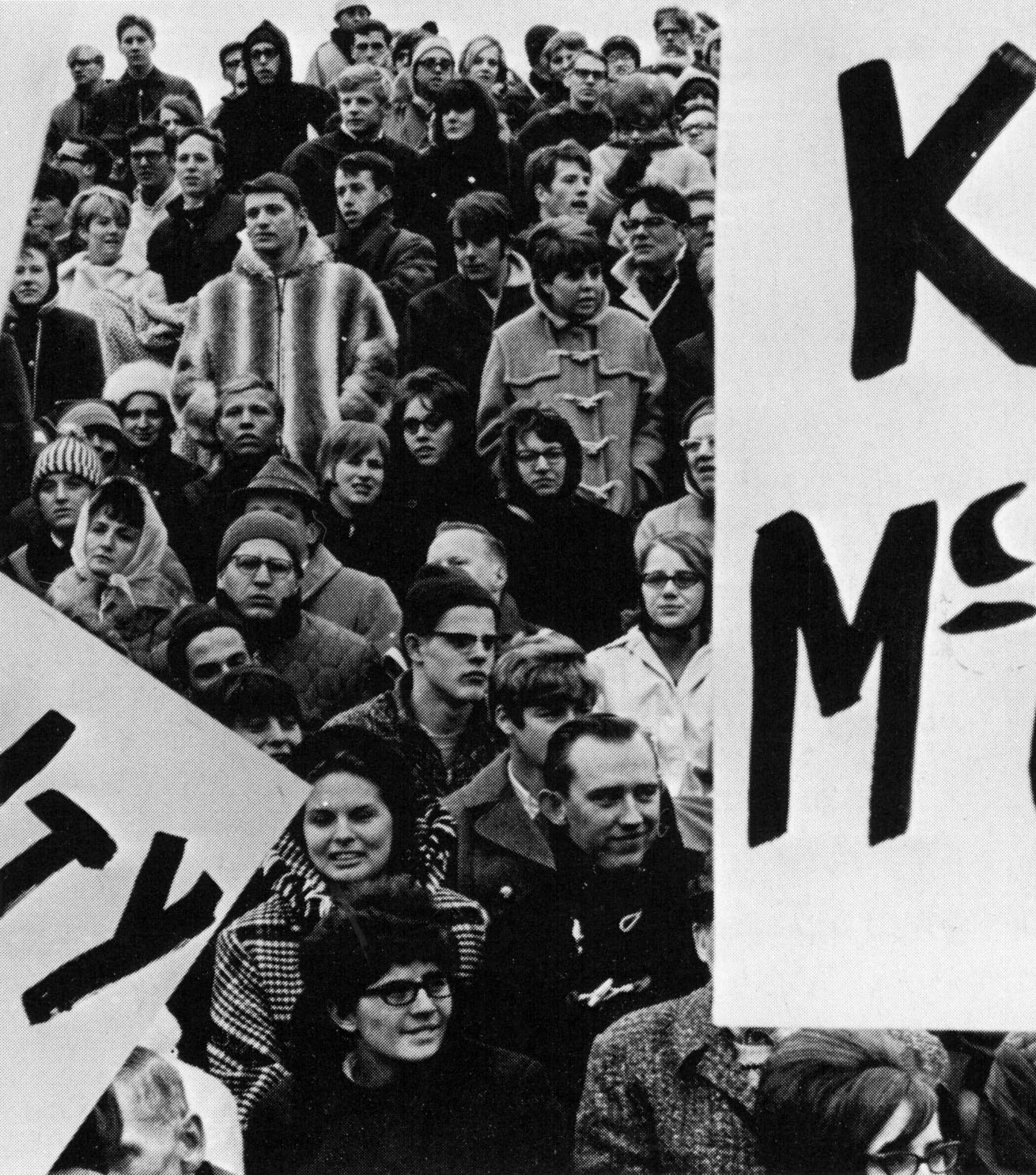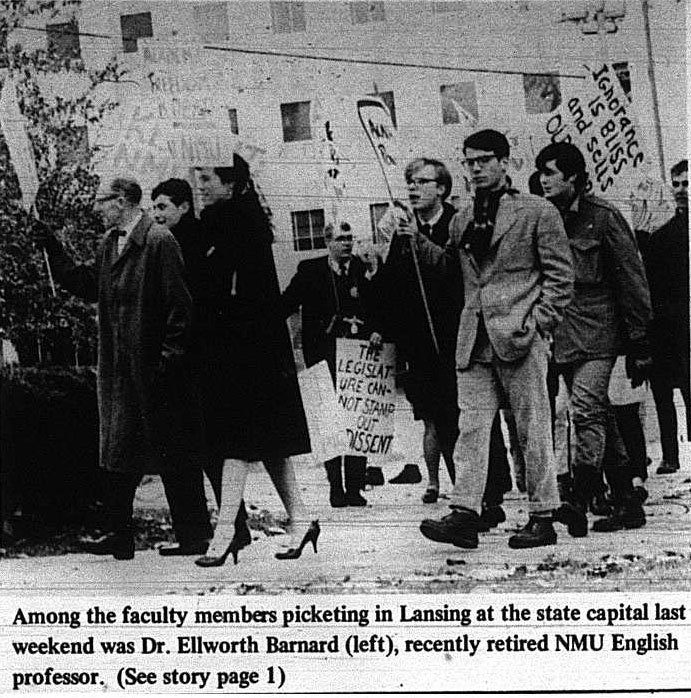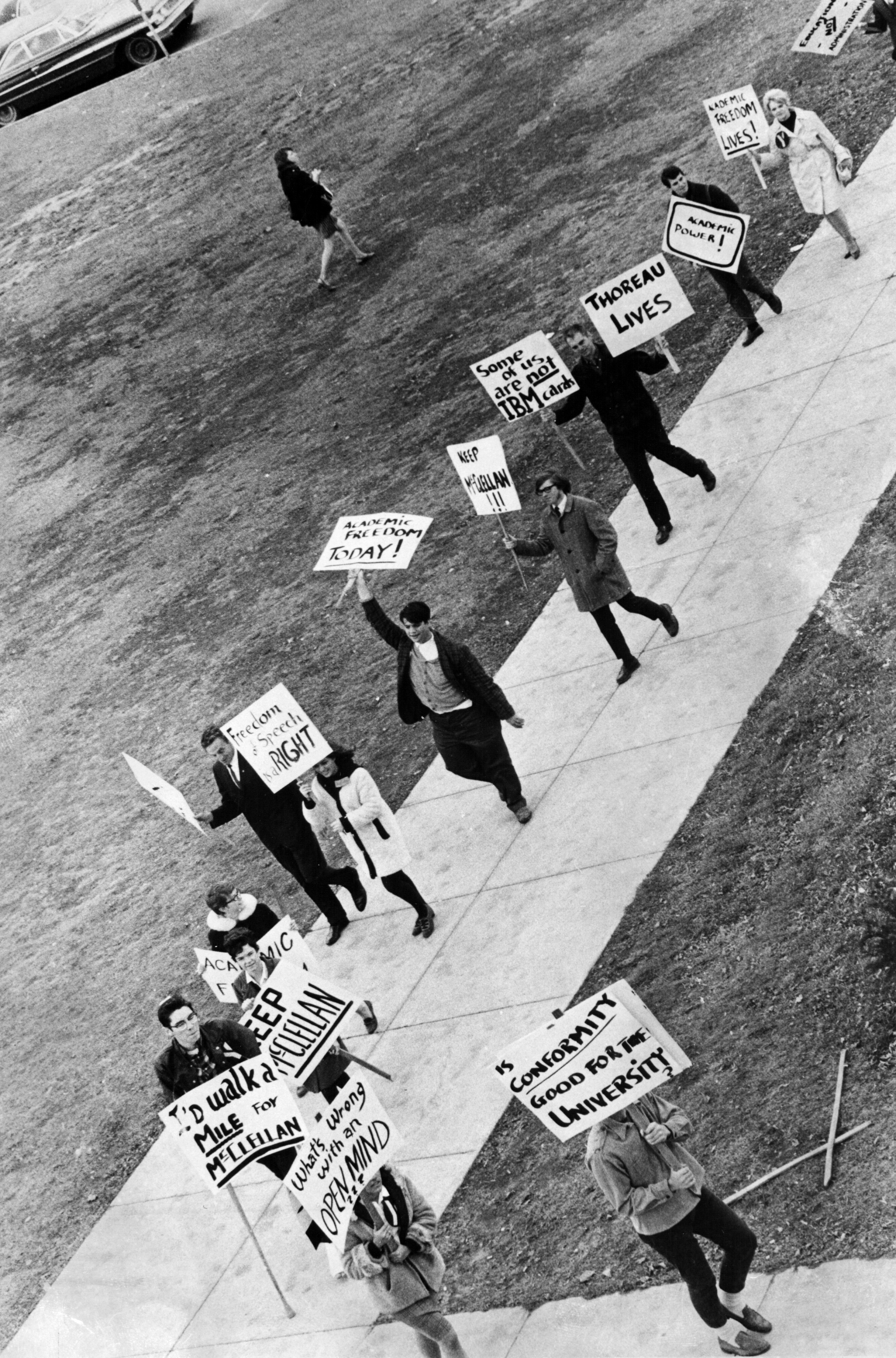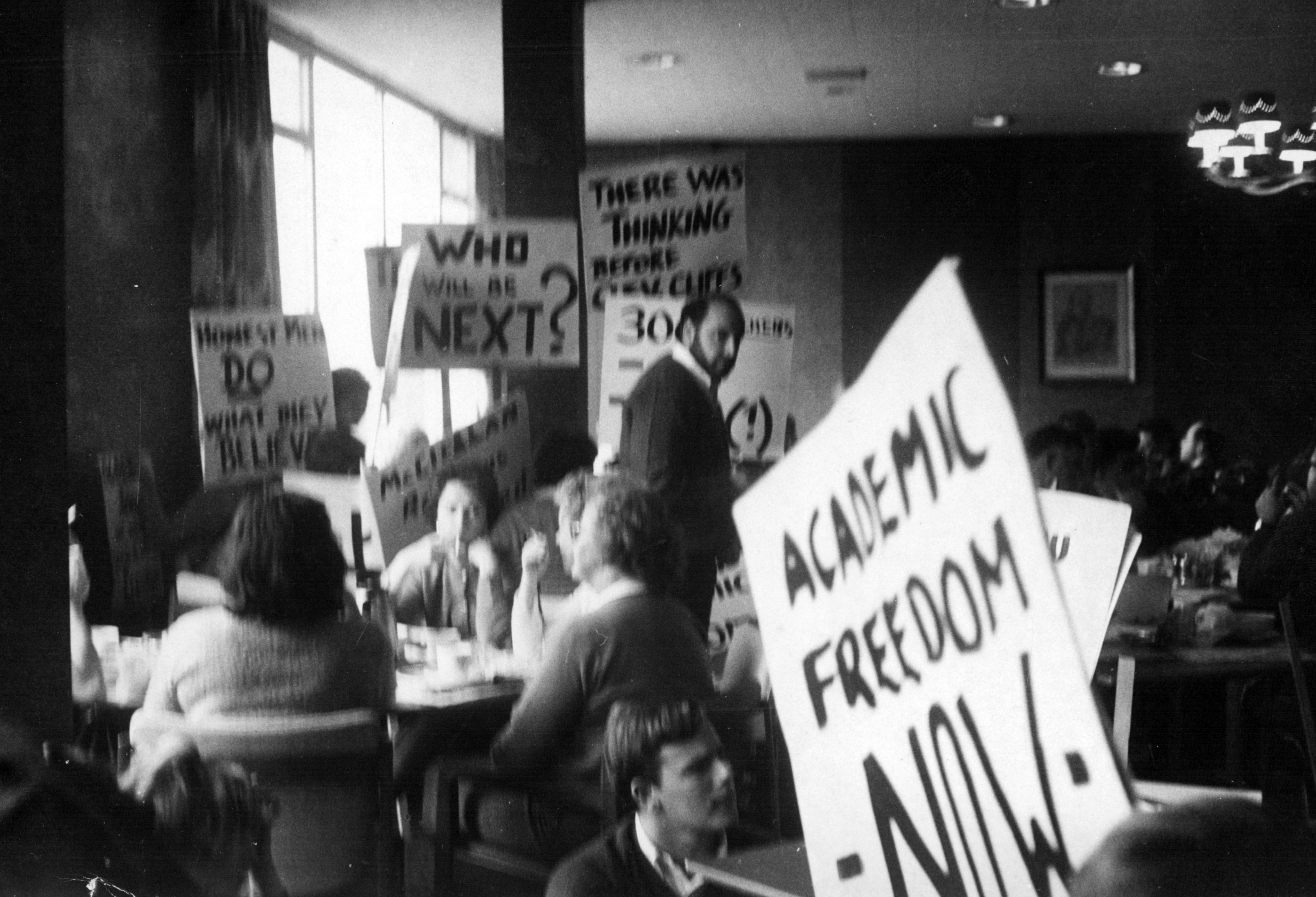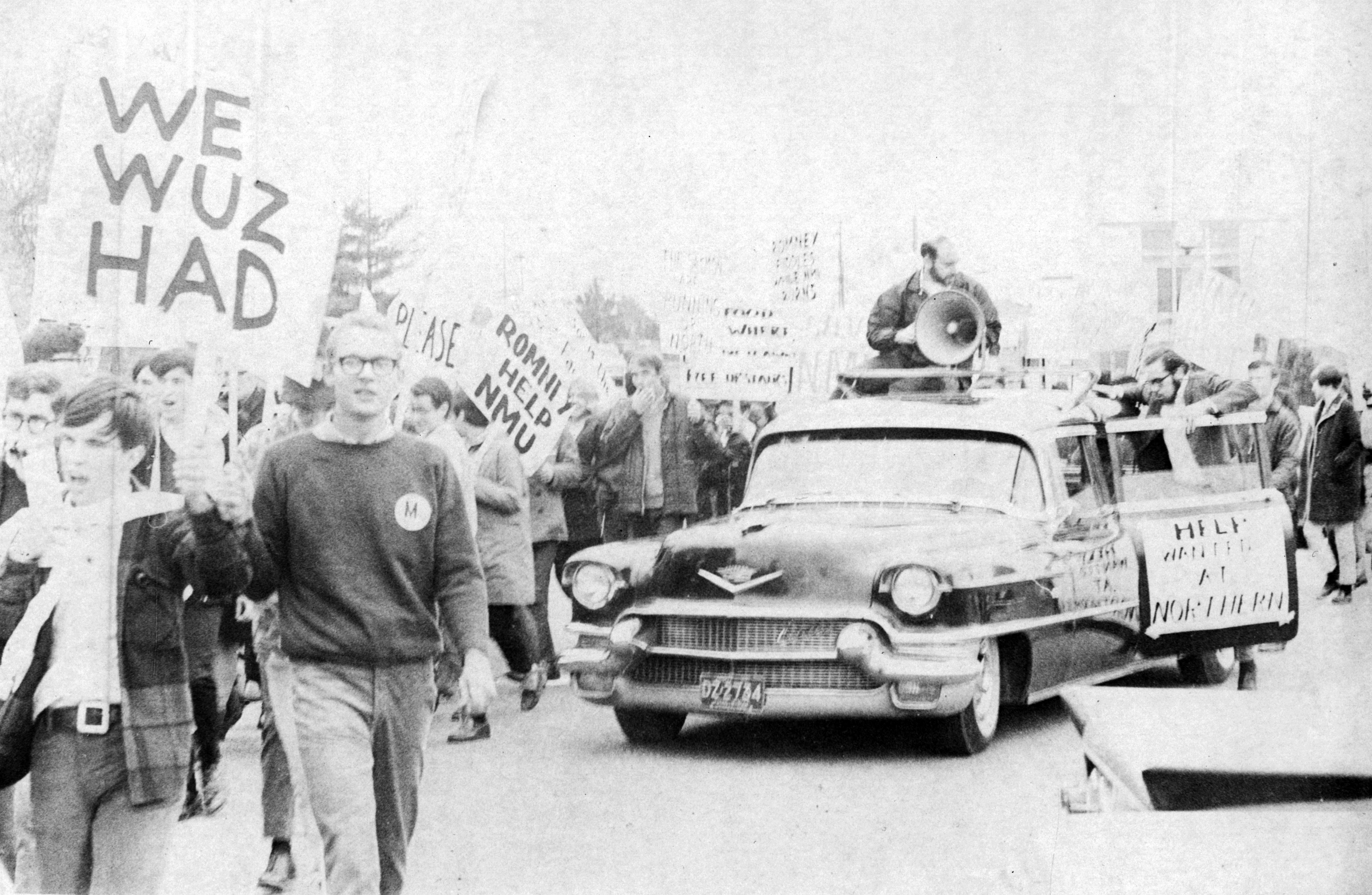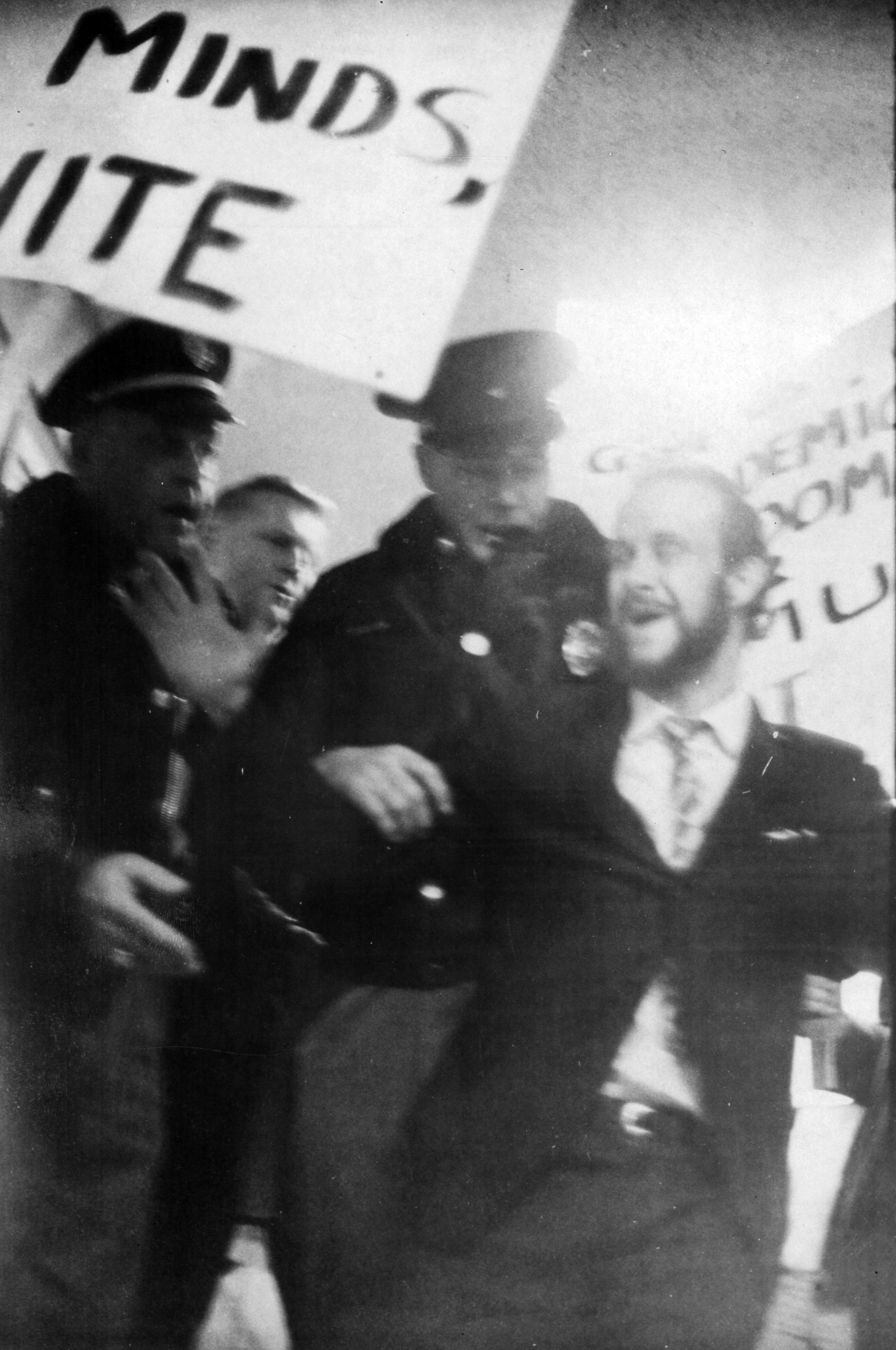The McClellan Controversy
The Firing of McClellan
One of Dr. Harden’s last acts before leaving Northern was to fire a history professor named Robert McClellan. McClellan was a young history professor who came to Northern in 1965. Although people sometimes said that he was outspoken and abrasive and he could be controversial, he was known for being an excellent and popular teacher. Harden treated McClellan inconsistently, sometimes giving him large raises and praising him and sometimes harshly criticizing him.
At first, the administration refused to give any rationale for their firing of McClellan. Since McClellan was known for pushing the envelope when it came to the administration, there are myriad reasons why the administration might have wanted to fire McClellan. However, he stated in an oral history interview that he believes he was primarily fired for his opposition to the expansion of the university. The university had a plan to buy parcels of land north of the university in an area that was then called North Marquette. Most of the people living in the area were working-class people who could not afford to move, and the university intended to forcibly relocate them. McClellan organized demonstrations to save North Marquette. Much of the faculty did not support him—McClellan stated that this lack of support may have stemmed from the fact that most of them were from the UP and were relatively conservative. They did not like going against any group with power, including the university administration, and they viewed McClellan as an “outsider” who was just causing trouble and giving the university a bad name.
The demonstration garnered a lot of publicity, and the “university looked terrible”. McClellan was summoned to a board meeting, where he discovered that the administration was annoyed with him. The meeting ended with the administration backing down. McClellan noted that “Harden looked bad.”
McClellan also angered the administration with what he said about North Marquette in his classes. He taught a Western Civilization class of three hundred people in the Kaye Auditorium. He noted in his interview that:
“It was a deadly dull environment where I—the faculty member--was up on a stage and the kids were out in these seats and I couldn’t blame them for being bored stiff. So, in order to galvanize things, I tried to make things as different as I could. And, in that process, sometimes I used the administration in comparison to the use of excessive power and I used North Marquette as an example of the administration running roughshod over people’s rights and how this is the kind of autocratic behavior that one would sometimes find, for example, in Nazi Germany. I must say I probably over-reached a little bit, but the administration was absolutely furious and proceeded to file charges against me for…saying things I shouldn’t have been saying and going beyond the scope of the class, just being a general bad boy, that sort of thing”.
McClellan also disagreed with the university over the Four Course Plan, a system which was used at Northern for only a few years before being discarded. Rather than signing up for courses of differing credits, students would be required to take exactly four courses each semester. Fewer choices would be offered, and the majority of students would take the exact same general requirements. McClellan explained that, at the time, people were very excited about the prospect. In retrospect, he thought that it was not worth fighting over. But at the time, he told students that
“It’s kind of silly…It really doesn’t matter how you rearrange the chairs. Whatever you have to do, there’s a fundamental interconnection that’s going to occur between the student and the faculty member or it’s not going to occur, and if it doesn’t occur, we both know what students are going to do—they’re going to tune it out and do what they have to do. If they need the grade they’ll do what the instructor tells them to do and if they don’t need the grade they’ll blow it off. And it just struck me that that was not the way to move forward in a little, tiny college stuck up there at the end of the earth, that what we really needed was to support the faculty, galvanize them, pay them better and stop going around the halls inspecting and looking at them and so on. I thought the university ought to be a free place where you give a faculty a block of time and students sign up and they go in there and see what happens. If the faculty’s any good he’ll galvanize the students and they’ll get interested and if he isn’t, as I said, they’ll just turn him off and do what they have to do to get through the course…To me the guts of the course is the faculty member, not the book, not the subject matter, not the title of the course, not the time of day, but the faculty member. If he or she is any good, then you’re going to have a good class, and if they’re not, then you’re not. And that was my position. It’s my position today and it was my position then and that was not what the administration wanted its faculty to be saying. It wanted the faculty to be saying…that the Four Course Plan would revolutionize learning and that Northern Michigan University would be a leader.”
These were not McClellan’s only offenses against the administration, however. He was the faculty advisor for the Committee on Student Affairs. In 1966, Northern constructed the Quad II dorms (Meyland, Magers, Hunt, and Van Antwerp Halls). When students arrived in the fall, the dorms were not finished. Many rooms were missing furniture, running water, and electricity, and live wires hung from the ceiling. Yet, students were still charged the full cost for living in the residence halls. As McClellan helped the students to investigate the case, more bad press for the university came to light. McClellan explained:
“We discovered that it was one of the inside jobs between the political people in Lansing and our good old then-President Edgar Harden and some bonds—John McGoff who was then the owner of the Mining Journal had gotten some bonds and there apparently had been some sweetheart loans arranged to pay for dormitories and that Edgar Harden had been paid a finders’ fee, if you can imagine that. The President of the university and others had done well and there’d been commissions paid and all this was state money and it had turned out to be a wonderful way for various individuals like the President of the university and the head of the Board of Control, which was what John McGoff was, to make a lot of money. And I blew the whistle on that and that didn’t make me very popular. I blew the whistle on it by going down to the legislature and looking in the books and discovering that these names kept coming up: Edgar Harden, John McGoff, over and over, and clearly these were the people who were profiting from the loans, and that the loans, in many cases, the interest was set high, and finders’ fees all over the place, and lots of money sloshing around, and the students—well, yeah, eventually they got a dormitory but that really wasn’t the primary motivation. The primary motivation was to get these sweetheart loans from the state and for these various participants in the loan funding mechanism to profit handsomely. I pointed that out in the student affairs committee and the students thought that was great, they thought that was a lot of fun to stick the administration in the eye but the administration had a very different view of my behavior—it was outside the classroom and nothing to do with what I was hired for and none of my business and I was being disloyal and all that nonsense. So I got in trouble for that.”
At another point, McClellan said that the administration was also concerned with the contents of his homilies as an Episcopalian priest, and that they had specifically “reacted to a ‘whispering campaign’ about him, accusing him of offering prayers in church for the Viet Cong.” Others speculated that another reason for McClellan’s dismissal was that he had previously questioned the Administration’s dismissal of three faculty members and had written a letter to Harden in which he stated that he “believed the University might be less committed to supporting the faculty than to preserving the University’s image beyond the campus.” Harden replied with his own letter, in which he wrote, “I find it difficult, Dr. McClellan, to assess the many reports that come to me about your highly negative attitude toward the university. It has seemed to me that you have been on the negative side of each issue confronting the university…We have no question as to your willingness to be critical of the University, the community, the church. We are raising some honest questions about your willingness to contribute as a scholar which, as I understand it, is your most important responsibility at this university…” At the time, McClellan was also calling for greater faculty participation in choosing the next President of the university, which could have been another factor in his dismissal.
